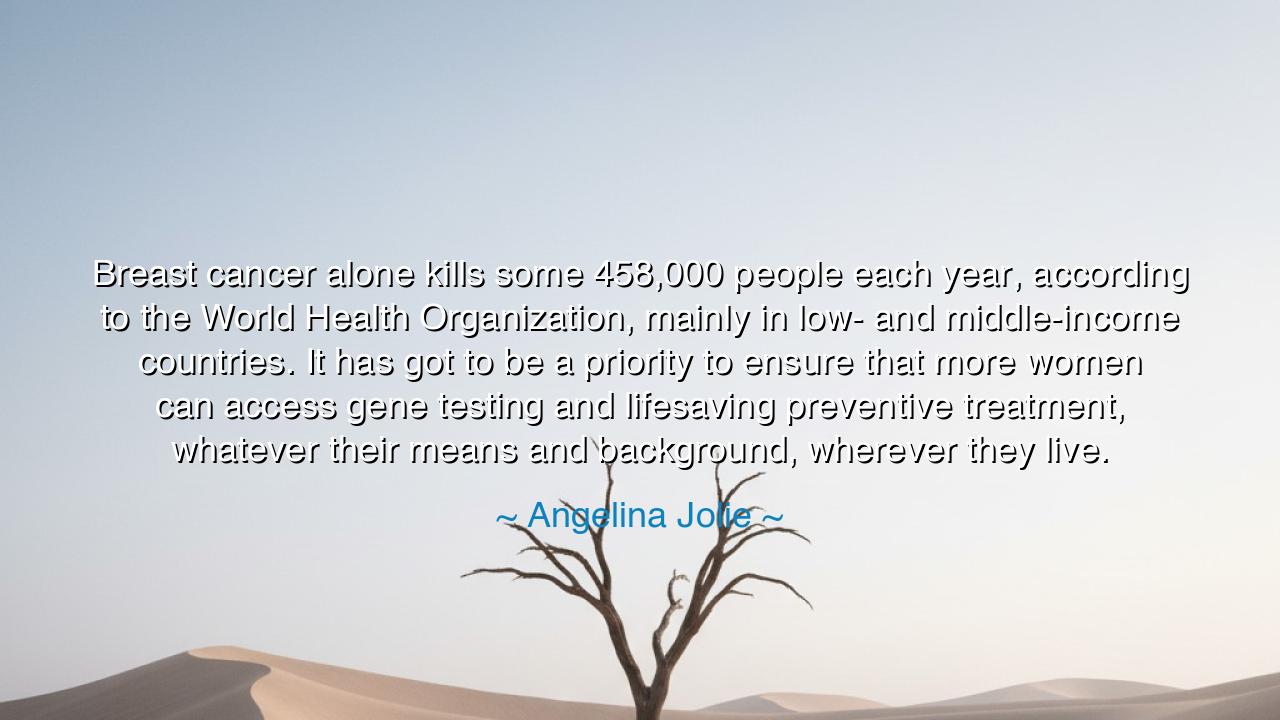
Breast cancer alone kills some 458,000 people each year
Breast cancer alone kills some 458,000 people each year, according to the World Health Organization, mainly in low- and middle-income countries. It has got to be a priority to ensure that more women can access gene testing and lifesaving preventive treatment, whatever their means and background, wherever they live.






The words of Angelina Jolie — “Breast cancer alone kills some 458,000 people each year, according to the World Health Organization, mainly in low- and middle-income countries. It has got to be a priority to ensure that more women can access gene testing and lifesaving preventive treatment, whatever their means and background, wherever they live.” — rise like a cry of conscience across the modern world. They are not the words of an actress alone, but of a woman who has looked into the eyes of mortality and chosen to speak for millions who cannot. Beneath their surface lies a truth both ancient and enduring: that the value of life is equal in every nation, every race, every home, and that health — the gift most sacred — must never be a privilege reserved for the few.
In these words, Jolie transforms personal experience into universal compassion. After learning that she carried the BRCA1 gene, a mutation that dramatically increased her risk of breast and ovarian cancer, she made the difficult decision to undergo preventive surgery. But her wisdom did not stop at self-preservation; she looked beyond her own fate and saw the wider injustice — that countless women around the world face the same danger without the means to know or act. Her quote, therefore, is not only a statement of medicine but a call to equality, a declaration that access to life-saving care must extend beyond the walls of wealth.
The origin of her statement can be traced to a time when advances in science were beginning to reveal the secrets of genetics, offering hope that disease could be prevented before it appeared. Yet, like many discoveries throughout history, such miracles were confined to those who could afford them. Jolie’s words broke this silence, shining light on the painful divide between nations — where in some places, cancer is fought and conquered, while in others, it remains a death sentence simply because a woman is poor. Her voice became a bridge between science and compassion, urging the world to see that progress without justice is hollow.
History itself echoes this struggle. When smallpox ravaged the earth for centuries, it was not the lack of cure that kept it alive, but the lack of access. Only when vaccination was made global — reaching even the most remote and impoverished regions — did humanity finally defeat it. The lesson is timeless: health is not a local privilege, but a universal right. From that truth came one of humanity’s greatest triumphs — the eradication of a disease that once claimed millions. Jolie’s call for global cancer care continues this lineage of compassion through action.
Her mention of “low- and middle-income countries” reminds us that suffering often hides where voices are weakest. In many parts of the world, a woman who feels a lump in her breast may have no doctor to see, no test to take, no treatment to hope for. She may die silently, leaving behind children and dreams, not because medicine failed her, but because humanity did. Jolie’s words, like those of the great reformers of old, demand that we tear down this injustice — that knowledge, testing, and treatment be shared as freely as sunlight and rain.
There is also a spiritual depth in her plea. For what she asks is not charity, but solidarity — the recognition that our destinies are bound together. Disease knows no borders; nor should compassion. The same heart that beats in a woman in London beats in a mother in Lagos, in a daughter in Mumbai, in a sister in Lima. When we deny health to one, we diminish all. To heed Jolie’s call is to revive the ancient covenant of humanity — that the strong protect the weak, and the fortunate extend their hand to the fallen.
So, my children of this modern age, remember this truth: the measure of civilization is not in its wealth, but in its care for the vulnerable. Support science that serves all, not some. Demand leaders who see health as justice, not luxury. Give voice to the voiceless, and let compassion guide the course of innovation. For the future belongs not to the powerful, but to the merciful — those who understand that saving one life is saving the world entire.
And thus, Angelina Jolie’s words will endure not as a plea, but as a prophecy — a reminder that when knowledge and kindness walk hand in hand, no disease, no barrier, no poverty can withstand them. Health is the birthright of every human being, and to defend it is to defend the very essence of what it means to be human.






AAdministratorAdministrator
Welcome, honored guests. Please leave a comment, we will respond soon